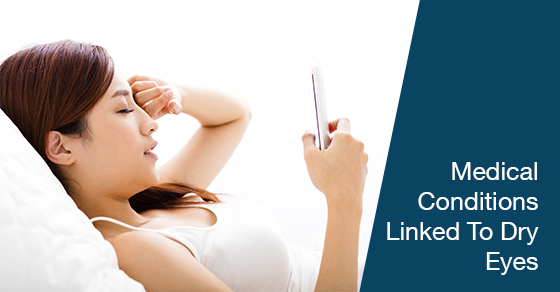Medical Conditions Linked to Dry Eyes
Monday, February 12th, 2018, 10:00 amEyes are the window to the soul. Through them, we can see how a person feels. However, an ophthalmologist looking into your eyes could see early signs of disease.

One of the most common complaints is dry eyes. A person with dry eyes might have a burning sensation in the eyes as well as redness and blurred vision.
What causes dry eyes?
Dry eyes occur when there is a decrease in the lubrication of the eyes caused by lack of tear formation. Tears are composed of fatty oils, water, mucus, and protein. When there is an inadequate amount of tears, eyes become dry and irritated.
There are certain medications that can also be the cause of dry eyes such as antihistamines, decongestant, hormone therapy, and medicines for Parkinson’s disease or high blood pressure. These medicines alter the makeup and supply of tears. Diuretics also affect the amount of tears formed.
Aside from these medications, another factor for dry eyes is medical conditions. These include rosacea (a skin disease) and blepharitis (an eyelid disease). Both affect the function of Meibomian glands which causes inadequate oil formation in tears. More often than not, autoimmune disorders can also cause dry eyes. These autoimmune disorders include Sjogren’s syndrome, lupus, and rheumatoid arthritis. Thyroid disorders and vitamin A deficiency can also cause dry eyes.
Another factor that contributes to dry eyes is the environment. a dry place can increase chances of having dry eyes, and habits – prolonged computer usage.
If you are experiencing dry eyes, over-the-counter medications like artificial tears are available. However, if it’s a recurring condition, or has lasted for more than a week, consult your ophthalmologist immediately. Dry eyes could be the sign of an underlying medical condition. If you are taking any medications that you suspect may be the cause, consult your doctor before switching medications.
Category: Dry Eyes
